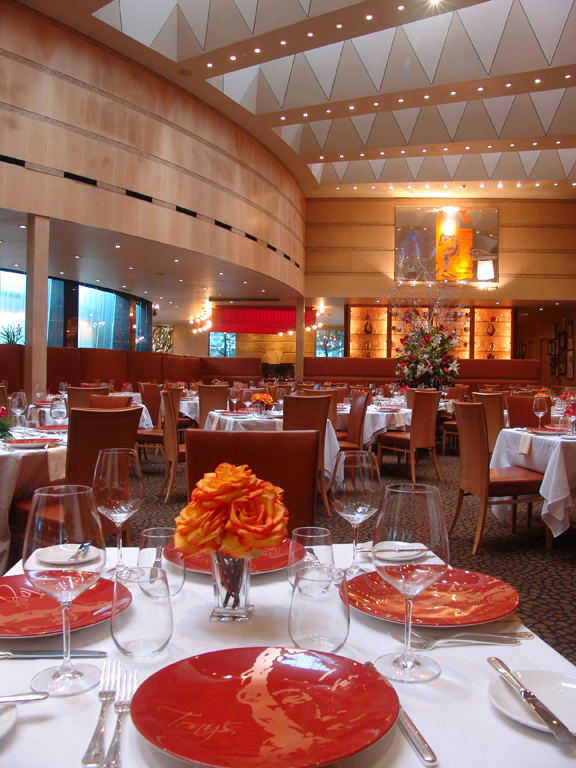The Maestro: Inside the Delectable Life of Tony Vallone
BY James Brock // 11.02.15Watching Tony Vallone preside over the perfect little world that is Tony’s — in my opinion, the best restaurant in the state of Texas and among the best in the U.S. — the concepts of order, harmony and zen mingle in my mind. Vallone, who celebrates his namesake restaurant’s 50th anniversary this month, conducts every movement at the Richmond Avenue institution with the grace of a consummate and controlled artist. If a dining-room chair is not where it should be, a nod from the 71-year-old puts it in place. If a guest is on the verge of making a request, Vallone is the first to anticipate it.
One attends performances at the New York Philharmonic expecting excellence, music performed with no note out of place. An evening spent at Tony’s offers the same sensual satisfaction.
My first glimpse of Vallone in his restaurant is something I recall often. I was walking across the dining room, and through the large (mostly glass) wall that separates it from the kitchen, this is what I saw: The maestro was wearing a dark-blue suit, and he was sitting in a simple chair in the kitchen, in front of the pass, one leg crossed over the other at the thigh, cell phone in hand. His face spoke of calm order, though all around him cooks and waiters went to and fro with haste, plates and cutlery and food in hand.
Aside from one summer working on an oil pipeline, Vallone has spent all of his days and nights in kitchens and dining rooms; they are his domain. He began his culinary journey in a dish pit, a teenager scraping food from plates and washing pots and pans. The stove called, however, and a grandmother from Naples, Maria Aiello Vallone, did something that thousands upon thousands of people are thankful for, though they never met her: She taught her young grandson to respect the art (and work) of cooking and the pleasure of eating.
“She raised me,” Vallone told me during a recent lunch. “I wasn’t so close to my parents, but without her, who knows what would have happened.”
Vallone’s grandmother would make traditional Neapolitan fare, including pasta paired with seafood, which was nonexistent in the ’60s and ’70s in Houston restaurants (and, outside of old-school places in the Bronx or Brooklyn, in U.S. restaurants in general). “Put something like that in front of most people back then, and they would think you were crazy,” he says. But the young man observed and learned, and he tasted, and he studied, and he changed the way Houstonians thought of Italian cuisine. Most importantly, perhaps, he never stopped asking questions.

He’ll never stop. I have had long conversations about food with many people in various locations around the world, from Paris to New York to Hong Kong, and none of those discussions has been more captivating than the ones I’ve shared with Vallone. We talk of sweetbreads and the importance of proper service etiquette. We speak about Tony May, of San Domenico fame, (whose retirement earlier this year leaves Vallone as one of the culinary world’s few elder statesmen) and Marcella Hazan. Our conversations could go on endlessly, interrupted only by a waiter bringing a ristretto — Vallone’s drink of choice — to the table.
Not long ago, I was eating at a local taqueria, and at one point the conversation drifted to Vallone and his place in the Houston restaurant scene. One of my dining companions, a 40-something man who attended a local culinary school and worked in several restaurants before making a career change, interrupted me and said, “This is going to sound odd, but I’m getting goose bumps talking about Tony. That man has done more than anyone to make Houston a great food city.” When, a few weeks later, I told Vallone of the conversation, his first response was to accuse the man of overstating the case. Then, after a brief pause, he looked at me and said, “Please bring your friend to lunch so I can meet him. We’ll sit and talk about food; it will be my treat.”
In the end, that will be Tony Vallone’s legacy. Beyond the thousands upon thousands of guests, beyond all of those meals served in elegant surroundings to presidents and socialites and royalty and you and me, we will honor the man for the way he has trained and schooled hundreds and hundreds of individuals in what it means to actually respect food. His eye for talent is unerring; many chefs and cooks — including Monica Pope, Marco Wiles and Mark Cox, to name but three now plying their trade at their own restaurants in Houston — learned their craft in his kitchens and went on to open their own places. Countless waiters and sommeliers rose to Vallone’s expectations of world-class service and passed the mission on to their colleagues, making our lives richer along the way.
Vallone is fond of saying that he will leave Tony’s only when he is carried out, a fish in one hand and pasta in the other. I, however, hope he will rethink that plan. I hope Tony Vallone will, with his wife, Donna, allow himself a well-deserved victory lap and spend uninterrupted months in his beloved Naples, sitting at a table, fork and knife in hand, a smile on his face and an uncorked bottle at the ready. It will be an endless meal.
Tony’s Restaurant celebrates its 50th anniversary with a dinner benefitting Memorial Hermann Life Flight Wednesday, November 18. For details, call 713.242.4450 or email cathleen.fishel@memorialhermann.org. Tickets $500; sponsorships from $50,000.









_md.jpeg)













